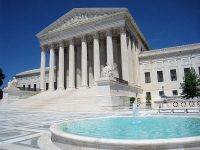Information contained in this publication is intended for informational purposes only and does not constitute legal advice or opinion, nor is it a substitute for the professional judgment of an attorney.
 In a ruling that will affect how unions conduct business and collect fees, the U.S. Supreme Court held that non-member employees represented by a public-sector union cannot be compelled to fund the union’s political and social speech without proper notice. Knox et al. v. Service Employees International Union, Local 1000, slip op. No. 10-1121 (June 20, 2012). A central issue in the case was what notice was required to be given to non-members by unions as to how their money would be spent. The Supreme Court previously held that unions are required to issue notices to non-members as to how their dues would be spent, to allow them to opt-out of non-collective bargaining activities. These are often referred to as “Hudson Notices” based on their decision in Teachers v. Hudson, 475 U.S. 292 (1986).
In a ruling that will affect how unions conduct business and collect fees, the U.S. Supreme Court held that non-member employees represented by a public-sector union cannot be compelled to fund the union’s political and social speech without proper notice. Knox et al. v. Service Employees International Union, Local 1000, slip op. No. 10-1121 (June 20, 2012). A central issue in the case was what notice was required to be given to non-members by unions as to how their money would be spent. The Supreme Court previously held that unions are required to issue notices to non-members as to how their dues would be spent, to allow them to opt-out of non-collective bargaining activities. These are often referred to as “Hudson Notices” based on their decision in Teachers v. Hudson, 475 U.S. 292 (1986).
In this case, Service Employees International Union, Local 1000 (SEIU) gave initial notice allowing an opt-out. Shortly thereafter, the union issued an additional 25% special assessment for political and social endeavors, for which it did not provide another opt-out notice. The Supreme Court held this practice to be a violation of notice provisions. Acknowledging that public-sector unions have a First Amendment right to express their views on political and social issues, the Court nevertheless concluded that an individual could not be compelled to subsidize the union’s speech. Consequently, a union leveling a special fee assessment or unexpected fee increase must provide objecting non-members a fresh opportunity to opt-out of the percentage of the fee earmarked for the union’s political or social mission, and may not charge nonmembers any fees without their “affirmative consent.”



